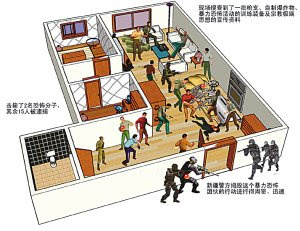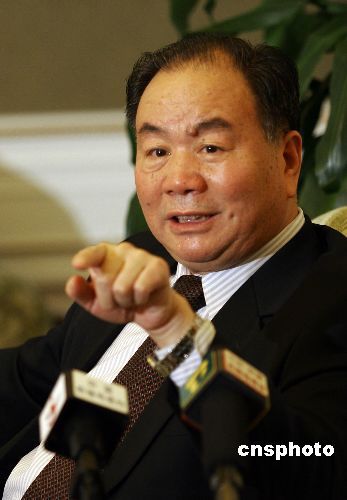 The third week of February was awfully busy for Xinjiang terrorism news.
The third week of February was awfully busy for Xinjiang terrorism news.
First, there were reports of a Uyghur terrorist cell being raided by the police in Urumqi, Xinjiang’s capital. The initial report appears to have been in Singtao Daily, the Hong Kong-based international Chinese language newspaper chain, on February 14th. It said that 18 were killed on February 4th in a huge police assault on an apartment in the Happy Gardens (幸福花园) complex, and two security officers were also killed in the full-scale gun battle. The report was subsequently carried over in smaller web publications on the Mainland like Zaobao, but officials would only confirm that there was an incident, nothing more.
Four days later, on February 18th, Global Times reported that the attack, according to an unnamed government official, happened on January 27th, at the Happy Gardens apartments, two terrorist suspects were killed and another fifteen captured. No police officers were injured, contradicting the previous report. Found at the scene, it was reported, were firearms, homemade explosives and instructive material from “external terrorist organizations”, and the suspects consequently “confessed to their crimes”. The article further mentioned that “the incident reminds us that security concerns are not limited to the Beijing Olympics”. The Chongqing Evening Daily website carried an article the following day from Xinjiang Daily that also included a rendering of the apartment assault (above), though it doesn’t look very authoritative with its two cops and 17 terrorists. A Global Times reporter also investigated the scene, finding little but noting that a local police official may have been removed from his position because the suspects were “right under their noses”.
As all this was going on, it was also reported that the Chinese military was rehearsing to combat biological and nuclear threats, while the Hong Kong pro-PRC paper Wen Wei Po said there were fears of such attacks from East Turkestan groups. Even more significantly, Xinjiang Party chief and all-around top guy Wang Lequan gave an extensive interview on Phoenix TV (video below). Notable highlights included
1) Opening with footage of Interpol Secretary General Ronald Noble warning of terrorist attacks at the Beijing Olympics, and FBI Director Robert Mueller speaking of his confidence in security during the Olympics, followed by the invocation of September 11.
2) Footage from the video of the “Hotan Conference” in 1996, where the Allah Party, or Hizbollah, of East Turkestan supposedly took oaths to sacrifice themselves to establish an Islamic extremist independent Xinjiang. Xinjiang scholar Yitzhak Shichor saw the same footage(PDF) as part of a Chinese documentary shown to him in 2002, and said of this and one other organization (The Party of Islamic Reformers) “At best, they are – or were –small and loosely organized of little operative value. At worst, they may have been a figment of Chinese imagination or even invented by Beijing. When the Chinese issued their list of “East Turkestan terrorist organizations” on December 15, 2003, these two “parties” have not been included.15 Are these terrorist organizations or not? It seems that Beijing has some doubts, at least.”
3) That after the Yili incident, the East Turkestan Independence Movement launched an assault on vehicles carrying prisoners with a “squadron of 40-50 bicycles”, leaving security forces no choice but to open fire and kill one person. “Voice of America said we killed 1000 people, blahblahblah, which is nonsense, simply not the case.”
4) Wang Lequan puts great emphasis on Document 7, a Politburo directive on Xinjiang stability drawn up in 1997. Before this, he says, the answers to such questions as “What is normal religion, what is illegal religion, what are reactionary religious forces, in the past all this was unclear”. The document clarified, first, that the principle of autonomy must be upheld, but foreign religious influence cannot be permitted. “Secondly, we must always remain comitted to the separation of church and state, not allow religious interference in adminstrative, judicial activities, things like education, health, the One Child Policy, these things…” Wang Lequan seemed to find nothing contradictory in advocating the separation of church and state and simultaneously defining “illegal religion”.
5) Wang Lequan tells that he was target #1 on an assassination list.
6) He wraps up with the tale of Rebiya Kadeer, who he claims funded external separatist forces (doesn’t say who), met with a veteran terrorist named Aisha(?) in Turkey, and spread both secret intelligence and terrible lies to people in the United States, and they released her from prison because she had repeatedly given self-criticism, repented, and there were lots of reasons. It’s not terribly clear. Everybody who supports her and her Nobel nomination, he believes, is being fooled. Most perplexing is Wang Lequan’s rambling last sentence:
我的看法,我就不相信,那些支持她的人,热比娅说的他们都会真信,都认为是真话,不是的,我的看法,那些人,热比娅不出去,热比娅不说,冷比娅说,他也是 一样,他天然就不想说中国的好话,我是这么看法,那些同情支持热比娅的人,不是糊涂虫,他们是骨子里边有毛病,热比娅不说他还编造事实搞这搞那,何况有一 个活人在那儿说呢,说啥信啥。
Why does it say “冷比娅“? Rebiya’s name in Chinese has the first character “re”, as in “hot”. This has the first character “leng”, as in “cold”. Somebody really tired type this up?
So, coincidence a terrorist raid is revealed at the same time that Wang Lequan makes a rather rare extended appearance and the PLA steps up anti-terrorist training while PRC media in Hong Kong plays up the Uyghur separatist threat?
Video 1: 王乐泉:90年代的“反恐”经历
Video 2: 王乐泉讲述“二五事件” 驳美国之音谣言
Video 3: 入恐怖分子“暗杀名单” 王乐泉:不怕
Video 4: 王乐泉:对付恐怖分子的策略

Very interesting. I did a fair bit of research into the threat of Xinjiang terrorism about a year ago, and it’s pretty hard to nail down whether the authorities are are doing a lot of lying and exaggerating (scholars too; Chinese books and articles that I found on the subject were really pathetically sourced) or whether they’re simply sloppy and/or don’t feel any obligation to give clear, detailed, and convincing accounts of events.Their language about the “East Turkestan Islamic Movement” is really slippery in both English and Chinese, too… I’ve found several instances of non-Chinese in positions of influence apparently falling into the trap of attributing all the incidents enumerated by the Chinese government to this to this one group, and the Chinese sure don’t seem to have worked real hard to correct this notion.
Shichor’s paper is good, and I’d suggest you take a look at James Millward’s paper “Violent Separatism in Xinjiang: A Critical Assessment” if you haven’t already:
http://www.eastwestcenter.org/fileadmin/stored/pdfs/PS006.pdf
@MAC: Yup, the language on ETIM and other groups is totally slippery, and I wrote almost one year ago about how one particular US academic seemed to be shoving that particular foot down his throat. And cited Millward’s Violent Separatism paper several times in making my point, actually. Sounds like you’ve been reading some of the good stuff.
I think the Chinese government is very purposefully keeping their language vague. It may not only be in order to maintain a tidy narrative (both domestically and abroad) about their “War on Terror”, but I’m pretty certain thats a big reason.
Oh, actually, I think I read that post you linked, as well as the article you ripped apart… but I swear I noticed the ETIM weaselry for myself!
Awesome finds. I love the creepy music they play when they cover the separatist meeting in Khotan.
I’m more inclined to believe later reports that there were no Chinese casualties, given how trumped up the funeral of the one “martyr” was in the aftermath of last year’s counter terrorism extravaganza.
“热比娅不说,冷比娅说”
it means, another woman would say if rebiya does not say. this is quite common in colloquial chinese, (with a bit of derogatory implication).
it is like, “even if Bush does not do this, Mr Bushie will, or Mr Wood will.”
—
re: ETIM or other organization. as we now all know, all these terrorist orgainsations are quite loosely organised. and it is easy to just change a name if this one got rooted or ‘blacklisted’ (by US or China).
both PRC and US know this. so the comprise is for US to admit there is at least one (ETIM), then everybody use ETIM as a placeholder for all these terrorist packs.
—
how much of PRC say is true or exaggeration. the truth must be between what they admit (and what western press reported) before 2001/9/11 and after.
before, PRC tried to deny everything if possible
after, they tried to disclose them as much as possible.
btw, the interview script is all over baidu. eg
http://www.china.com.cn/news/txt/2008-02/20/content_10222179_4.htm
@Sun Bin: so it’s kinda like saying “Dave, Schmave”? Do you normally use an antonym in substitution or can it be any old thing?
As for the link, I did provide one to one copy above (linked as “an extensive interview”), but maybe that wasn’t clear. Yes, it’s all over the place. But I’m not up for doing a complete translation, just a highlight reel.
yes, sort of like ‘dave, schmave’. the tone is usually derisive
antonym – i think it is for convenience and east of use.
sometime it could be replacing, eg, east with ‘south’ or ‘west’ or ‘center’.
“Opening with footage of Interpol Secretary General Ronald Noble warning of terrorist attacks at the Beijing Olympics, and FBI Director Robert Mueller speaking of his confidence in security during the Olympics, followed by the invocation of September 11.”
It is nice to see that the EU and US are towing Beijing’s line (yet again) for the sake of a “harmonious” olympics which will only benefit China. And all of this is due to the hard work of our panda licker diplomats and traitorous corporations.
Webmaster.it is a great job!
Now,I suppose “Aissha” is Isa Yusf Arptekin.
Highlighting the contradiction between “separation of church and state” and “illegal religion” is funny, though not really fair, because “separation of church and state” has never meant to be a mutual separation, but always a one-sided one: Keeping the church out of the state, not vice versa.
Even in today’s Western democracy world, there is not a single country without a great number of laws putting boundaries on religion. So yes, there is a cognitive dissonance, but its based on linguistic imprecision of the term, rather than any substantive conflict.
@wgj: I take ur point, and I agree that most or all governments have laws circumscribing the practice of religion. My point was that in Xinjiang, religion is only permitted when it is sanctioned, operated and controlled by the state. There is no separate religion. Priests, imams and the like must be trained at state schools, certified by the state, and vetted by the Party. Religion is not allowed to be an independent activity or organization in the first place, so there’s no separation at all. In countries such as the U.S., the government does not get involved in the operations of churches, approve their pastors or priests, make state-run seminaries their only option, or demand that they adhere to a political ideology (not the same as following the law).
Anyway, that’s why I thought it was a ridiculous thing for him to say.
may i add that the control on religion, (or more precisely, religios organisation) extends to christianity and other almost all other religions across china. it is not xinjiang or uighur specific.
the g.c.-d today does not control religion per se. it just want to control organisation, which it views as a threat to its power
Religion is not allowed to be an independent activity or organization in the first place, so there’s no separation at all.
————————
Yes, Chinese government cannot bear any organization inside China under foreign control. Neither Christian.